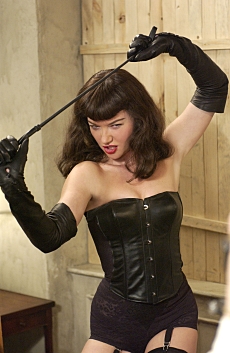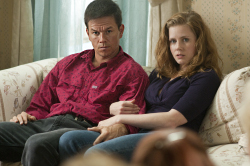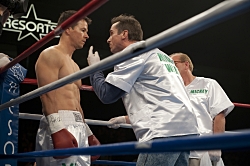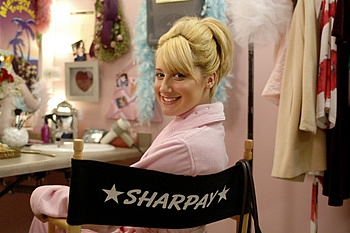Buy The Notorious Betty Page at Amazon
Popular on LondonNet
 Returning to the big screen after a three-year absence, Gretchen Mol delivers an uncompromising and unabashed turn in the title role of Mary Harron’s The Notorious Bettie Page. A provocative story of innocence lost, who better than the Connecticut-born Mol to play the ’50s fetish icon, having been something of a pin-up herself in the late 1990s? It was during this time that she amassed a hugely impressive body of work for such auteurs as Abel Ferrara (The Funeral, New Rose Hotel), Woody Allen (Celebrity, Sweet and Lowdown), Tim Robbins (Cradle Will Rock) and Neil LaBute (The Shape of Things). Yet after facing the intense Hollywood spotlight, Mol turned her back on the film world to concentrate on theatre – which saw her enjoy a very successful run as Roxie Hart in a Broadway production of Chicago. Now based in LA with her filmmaker-husband Tod Williams (who directed The Door In The Floor), Mol is once again enjoying a high profile on the big screen. Recently appearing in the acerbic romantic comedy Puccini For Beginners, which premiered at the 2006 Sundance Film Festival, her forthcoming films include Trainwreck: My Life As An Idiot.
Returning to the big screen after a three-year absence, Gretchen Mol delivers an uncompromising and unabashed turn in the title role of Mary Harron’s The Notorious Bettie Page. A provocative story of innocence lost, who better than the Connecticut-born Mol to play the ’50s fetish icon, having been something of a pin-up herself in the late 1990s? It was during this time that she amassed a hugely impressive body of work for such auteurs as Abel Ferrara (The Funeral, New Rose Hotel), Woody Allen (Celebrity, Sweet and Lowdown), Tim Robbins (Cradle Will Rock) and Neil LaBute (The Shape of Things). Yet after facing the intense Hollywood spotlight, Mol turned her back on the film world to concentrate on theatre – which saw her enjoy a very successful run as Roxie Hart in a Broadway production of Chicago. Now based in LA with her filmmaker-husband Tod Williams (who directed The Door In The Floor), Mol is once again enjoying a high profile on the big screen. Recently appearing in the acerbic romantic comedy Puccini For Beginners, which premiered at the 2006 Sundance Film Festival, her forthcoming films include Trainwreck: My Life As An Idiot.
What was the attraction of The Notorious Bettie Page?
Well, Mary [Harron, director] and an amazing role. Bettie Page was a total departure from myself – though not really, I realised, once I got involved with it.
How much did you know about Bettie Page before you started?
I didn’t know much about her. I knew the iconic image of the woman with the black bangs and leopard-print bikini. But I didn’t really know much about her life. The script was the first time I really started to think, ‘There’s really something interesting here’. I had seen, on one of those entertainment shows, a biography special about her life – very brief. The thing that I remember that stood out to me was, after seeing image upon image of this woman with a sunny smile in various poses, was hearing her speak at the very end. She had this amazing, earthy voice – and a really strong accent. The juxtaposition of the voice and the images…I remember thinking, ‘That voice doesn’t go with the image. Who is she?’ And that was before I read the script.
What initial preconceptions did you have of her?
Because of the image that I’d seen of her, I always thought she was a bit of a bad girl, somehow, and was pushing the envelope and had that awareness. But every time she was ever quoted, she never took responsibility in that way – she’d just say, ‘I was just doing my job, doing the best I could’. It was everyone else who decided that she was this feminist woman ahead of her time. In fact, there’s a floating quality to her life. She didn’t necessarily make choices. She was kind of a loner. That was interesting to me. And also her relationship with religion and God was very interesting.
She’s a victim and a survivor at the same time…
Yeah. I came to really feel that she was not a victim at all – because of the fact that she got up and dusted herself off and kept moving. So I loved that about her. Then, on the other hand, what I liked about the script was that it was almost a deconstruction of this iconic image – showing an ordinary woman who had foibles. It really found who Bettie Page was; it was hard to put her into a little box. You couldn’t quite figure her out. What was interesting about the part was being OK with that. Let her be a little bit of an enigma – even to myself.
Were you nervous about taking the role on?
Well, I was nervous mostly because she has such a fan-base and is a living human being. I wanted to respect her and do right by her, and that was such a responsibility. So those were the harder things, but as far as the character goes, I was so excited to have something that I could get as involved in as I was.
 So the nudity didn’t bother you?
So the nudity didn’t bother you?
Of course I thought about it. But I got behind what I took to be Bettie’s philosophy – lack of shame and pure enjoyment. Her most powerful photographs were the ones where she was nude and outdoors. When you look at those pictures, she had a boundary around her, always. She was in her own world, enjoying – and this was another reason why she’s not a victim – herself. She seems to get as much out of the posing as the audience did.
What do you think about Bettie’s seeming naïveté about her work?
I think that in the ’50s in general, people didn’t over-talk things. I see that with the way my grandmothers are. Certain things in life are not talked about – the abuse she suffered, I don’t think she ever really sat on a couch and worked that out. So I think even with the fetish wear…she was aware. I don’t think she was totally naïve but it didn’t really serve her to think about that too much. She was living in New York City, struggling to try to be an actress, and she’s making a living in the meantime – doing something she was pretty good at. She had a family atmosphere, and I do believe that to be true. There was a naïveté, regarding the fetish wear. They didn’t have the Internet, it wasn’t on every street corner. The idea of somebody being into boots…I think she was not judgmental in that way. She was like, ‘OK, I’ll put the boots on!’ It was costumes for her!
How does it feel to see yourself dressed up on the poster?
I’m happy for the wig – it does give me some distance! It means I can watch the movie, quite frankly. I just feel with that wig, from the beginning it was what allowed me to be Bettie. It’s the same thing that allows me to enjoy the film – it’s not quite me.
Did you keep anything from the set?
I got to keep my wardrobe! All of it. The boots were custom made to fit my legs. Most of it’s just in a box. I don’t really take it out! I did a photo shoot with Jeff Koons for the New York Times magazine, a couple of weeks ago, and we did some images of Bettie with his inflatables. And it was so much fun. But I said, ‘If I’m going to do Bettie, I want to use what we had for the film’, so I went out and dug out some of those things. And I’m so happy to have that. He wanted to show the transition for me to Bettie.
What do you think Bettie would do these days, if she made the same choices in life?
I don’t know. That’s the thing about Bettie. She would do what she did, but she wouldn’t sleep with the producer…she had a core sense of something about herself, how far she would go. I can’t say. The one thing she always stood by – which is the interesting thing about the film – is shown in the Senate investigation, which bookends the film. Really the whole thing starts with Bettie sitting out there, waiting to testify, and she sits and she sits, and then the movie happens and then you come back. And they say, ‘We don’t need your testimony’. And I’ve heard Bettie talk about it in interviews. She would’ve defended what she did as not pornography. Nobody was having sex, you weren’t even in the photographs with men and they were wearing two pairs of underwear – it really wasn’t what was wrong with it.
What happened to Bettie after the film ended?
She had a couple of mental breakdowns – she was diagnosed schizophrenic in the ’60s. She wanted to become a missionary. The pamphlet scene in the film, that was real. She did get remarried – to her first husband, Billy Neal. Mainly because she wanted to be a missionary and they wanted her to be married. So she married him again, and then converted him! Now she lives by herself in Southern California. She’s pretty reclusive.
Did you ever meet her?
I didn’t meet her. She had sold her life-rights to another film production – though that’s not happening now. I think she needed money at the time. Mary had tried to contact her, and this explanation came forward, and we had to respect the boundaries. I would love to meet her. Apparently, she’s just done an interview for the LA Times. I think she has seen the movie – Hugh Hefner showed it to her at the Playboy mansion. They still have a relationship. I’m sure it must’ve been really very odd for her. It’s one of those things where I’d love to meet her.
Could you relate to her acting experiences – the rejections?
Yeah, I could relate to the nerves. I feel, in a way, you keep hopefully growing into yourself, as an actor. Hopefully you keep growing into it. I definitely feel like I have. I feel like when I first started, I was floundering around trying to find it – the confidence wasn’t there, always. Those are tough moments but that’s how you learn.
Do you expect to feel some heat around your film career after this?
I can already feel a little bit. I was certainly not doing much in the way of film for a while – The Shape of Things was the last one. It was pretty sporadic. But now I feel more energy, at least. Now I can come out in a different way – my way. It’s more comfortable.
What are you working on next?
I’m going to do a film called Trainwreck, that my cousin is directing – his name is Tod Harrison Williams. It’s shooting in New York for 24 days, real quick. The subtitle is: My Life As An Idiot and it’s based on an unpublished memoir of this comedian called Jeff Nichols – played by Seann William Scott. He confesses to have all these addictions – so he’s in AA – and learning disabilities. But it’s questionable whether that’s even true. He’s just found a life to himself trying out all of these meetings, and my character is in the meetings. It’s a smart, fun script.
 Buy The Notorious Betty Page at Amazon
Buy The Notorious Betty Page at Amazon







